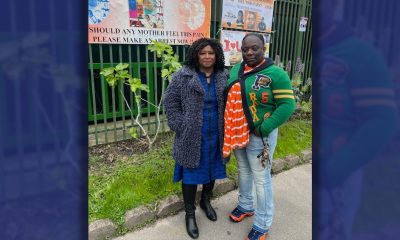Bay Area
Memorial Service Held in Castro Valley for Oakland Police Officer Killed in the Line of Duty
On Wednesday morning, a memorial service was held at 3Crosses Church in Castro Valley to honor the memory of Tuan Le, an Oakland police officer who was tragically killed in the line of duty on Dec. 29. Le was fatally wounded during an attempted burglary at a cannabis dispensary and was rushed to Highland Hospital where he died of his injuries hours later.

By Magaly Muñoz
On Wednesday morning, a memorial service was held at 3Crosses Church in Castro Valley to honor the memory of Tuan Le, an Oakland police officer who was tragically killed in the line of duty on Dec. 29.
Le was fatally wounded during an attempted burglary at a cannabis dispensary and was rushed to Highland Hospital where he died of his injuries hours later.
Family, friends and members of the community, including Oakland Mayor Sheng Thao and Alameda County District Attorney Pamela Price, gathered at the church to pay tribute to the dedicated and passionate officer they will dearly miss.
California Attorney General Rob Bonta spoke about Le’s desire and courage to keep Oakland safe for everyone.
“I didn’t have the privilege or the opportunity to personally know Officer Le, but I didn’t have to in order to know that he loved this city, and that this city loved him,” Bonta said.
Bonta added that in the wake of the tragedy, many people shared stories about the type of person Le was, describing him as a passionate, bright smiling, cheerful, and dependable individual. He acknowledged that California is in debt to the courageous law enforcement officers who risk their lives to protect and serve their communities.
Hundreds of people filled the seats and waited outside 3Crosses to pay their respects to the family and friends of Le. Several people, including the Interim Police Chief of OPD and Le’s family, spoke during the service.
Interim Chief Darren Allison choked up with tears while sharing the time he spent knowing Le during his service at the police department.
He recalled the day that Le graduated from the police academy in February of 2020, where he nervously pinned a badge on the new officer who had long aspired to follow in his grandfather’s footsteps to become a police officer.
“As I successfully pinned his badge, I remember the newly minted Oakland police officer Tuan Le and his broad smile as he beamed with pride in achieving his lifelong dream,” Allison said.
Allison shared that he had begun reflecting on the difficulties and sacrifices inherent in their job b, as many do when faced with tragedies like e, asking himself “If this is how it ends, why do we answer the call?” He acknowledged that while the job isn’t glamorous, officers like Le knew that the community depended on him to keep the chaos at bay and that the job was a calling only few would understand. The sacrifice that Le made will be immortal and he will be deeply missed.
Le was born to a single mother in Saigon, Vietnam before immigrating at seven years old to Oakland. He graduated from Oakland High School and received his bachelor’s degree from San Francisco State University. He worked at OPD for four years before his untimely passing.
His cousin, Jennifer Ky, tearfully shared a childhood story of young Le before he moved to the U.S., where he asked his mother to buy him an apple and his mother’s hesitancy because of how tight their finances were at the time. She ultimately decided to buy it for Le, knowing it would be the last time he would be in Vietnam.
Le, who Ky jokingly said had never been shy about eating even at seven years old, chose to wait and share the apple with his two cousins who he’d been living with as a farewell gesture before leaving for a new country.
“This was the kind of person Tuan was at seven years old and at 36 years old,” Ky said through her tears. “From childhood to now, we will always remember Tuan for his willingness to share his time, making the effort to bring us together.”
The speeches were followed by a flag and badge ceremony presentation for his wife and mother, with a final radio call shortly afterwards.
The memorial service ended with a procession of officers, guests and family lined up outside the church to follow Le’s casket to his final resting place after a flyover tribute.
Activism
Oakland Post: Week of April 24 – 30, 2024
The printed Weekly Edition of the Oakland Post: Week of April 24 – 30, 2024

To enlarge your view of this issue, use the slider, magnifying glass icon or full page icon in the lower right corner of the browser window. ![]()
Alameda County
DA Pamela Price Stands by Mom Who Lost Son to Gun Violence in Oakland
Last week, The Post published a photo showing Alameda County District Attorney Pamela Price with Carol Jones, whose son, Patrick DeMarco Scott, was gunned down by an unknown assailant in 2018.

Publisher’s note: Last week, The Post published a photo showing Alameda County District Attorney Pamela Price with Carol Jones, whose son, Patrick DeMarco Scott, was gunned down by an unknown assailant in 2018. The photo was too small for readers to see where the women were and what they were doing. Here we show Price and Jones as they complete a walk in memory of Scott. For more information and to contribute, please contact Carol Jones at 510-978-5517 at morefoundation.help@gmail.com. Courtesy photo.
Bay Area
State Controller Malia Cohen Keynote Speaker at S.F. Wealth Conference
California State Controller Malia Cohen delivered the keynote speech to over 50 business women at the Black Wealth Brunch held on March 28 at the War Memorial and Performing Arts Center at 301 Van Ness Ave. in San Francisco. The Enterprising Women Networking SF Chapter of the American Business Women’s Association (ABWA) hosted the Green Room event to launch its platform designed to close the racial wealth gap in Black and Brown communities.

By Carla Thomas
California State Controller Malia Cohen delivered the keynote speech to over 50 business women at the Black Wealth Brunch held on March 28 at the War Memorial and Performing Arts Center at 301 Van Ness Ave. in San Francisco.
The Enterprising Women Networking SF Chapter of the American Business Women’s Association (ABWA) hosted the Green Room event to launch its platform designed to close the racial wealth gap in Black and Brown communities.
“Our goal is to educate Black and Brown families in the masses about financial wellness, wealth building, and how to protect and preserve wealth,” said ABWA San Francisco Chapter President LaRonda Smith.
ABWA’s mission is to bring together businesswomen of diverse occupations and provide opportunities for them to help themselves and others grow personally and professionally through leadership, education, networking support, and national recognition.
“This day is about recognizing influential women, hearing from an accomplished woman as our keynote speaker and allowing women to come together as powerful people,” said ABWA SF Chapter Vice President Velma Landers.
More than 60 attendees dined on the culinary delights of Chef Sharon Lee of The Spot catering, which included a full soul food brunch of skewered shrimp, chicken, blackened salmon, and mac and cheese.
Cohen discussed the many economic disparities women and people of color face. From pay equity to financial literacy, Cohen shared not only statistics, but was excited about a new solution in motion which entailed partnering with Californians for Financial Education.
“I want everyone to reach their full potential,” she said. “Just a few weeks ago in Sacramento, I partnered with an organization, Californians for Financial Education.
“We gathered 990 signatures and submitted it to the [California] Secretary of State to get an initiative on the ballot that guarantees personal finance courses for every public school kid in the state of California.
“Every California student deserves an equal opportunity to learn about filing taxes, interest rates, budgets, and understanding the impact of credit scores. The way we begin to do that is to teach it,” Cohen said.
By equipping students with information, Cohen hopes to close the financial wealth gap, and give everyone an opportunity to reach their full financial potential. “They have to first be equipped with the information and education is the key. Then all we need are opportunities to step into spaces and places of power.”
Cohen went on to share that in her own upbringing, she was not guided on financial principles that could jump start her finances. “Communities of color don’t have the same information and I don’t know about you, but I did not grow up listening to my parents discussing their assets, their investments, and diversifying their portfolio. This is the kind of nomenclature and language we are trying to introduce to our future generations so we can pivot from a life of poverty so we can pivot away and never return to poverty.”
Cohen urged audience members to pass the initiative on the November 2024 ballot.
“When we come together as women, uplift women, and support women, we all win. By networking and learning together, we can continue to build generational wealth,” said Landers. “Passing a powerful initiative will ensure the next generation of California students will be empowered to make more informed financial decisions, decisions that will last them a lifetime.”
-

 Activism4 weeks ago
Activism4 weeks agoOakland Post: Week of March 27 – April 2, 2024
-

 #NNPA BlackPress4 weeks ago
#NNPA BlackPress4 weeks agoBeloved Actor and Activist Louis Cameron Gossett Jr. Dies at 87
-

 Community1 week ago
Community1 week agoFinancial Assistance Bill for Descendants of Enslaved Persons to Help Them Purchase, Own, or Maintain a Home
-

 Activism3 weeks ago
Activism3 weeks agoOakland Post: Week of April 3 – 6, 2024
-

 Business2 weeks ago
Business2 weeks agoV.P. Kamala Harris: Americans With Criminal Records Will Soon Be Eligible for SBA Loans
-

 Activism2 weeks ago
Activism2 weeks agoOakland Post: Week of April 10 – 16, 2024
-

 Community2 weeks ago
Community2 weeks agoAG Bonta Says Oakland School Leaders Should Comply with State Laws to Avoid ‘Disparate Harm’ When Closing or Merging Schools
-

 Community1 week ago
Community1 week agoOakland WNBA Player to be Inducted Into Hall of Fame



















































